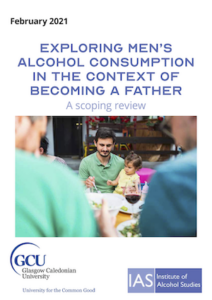View this report

Background and aim
The transition to fatherhood may present a ‘teachable moment’ when men evaluate their health, modify existing health behaviours and adopt new ones. This scoping review synthesises evidence on men’s experiences of alcohol consumption in the context of fatherhood, and on the effectiveness of existing interventions to reduce drinking among new fathers.
Findings
The review identified five articles published in peer-reviewed journals, and one protocol. Three qualitative studies explored fathers’ experiences of alcohol consumption, two studies reported interventions to reduce alcohol consumption in new fathers, and one was a protocol for an intervention.
The qualitative studies suggest that men may reduce their drinking to support their pregnant partner. However, men’s alcohol consumption beyond this narrow focus is rarely explored. Only one study explored in depth men’s views of problematic drinking during fatherhood and found that men believed that fathers should be a role model for their children.
The review identified two interventions, and only one showed significant reduction in alcohol use among fathers. This was a smoking intervention which did not address alcohol directly. The study suggests that couple-based interventions may be effective in addressing health behaviours.
This scoping review suggests that text message interventions may offer a promising avenue for engaging with men but their effectiveness in addressing alcohol use in new and expectant fathers is unclear.
This review found that it is feasible to recruit expectant and new fathers through antenatal clinics, hospitals and other venues where fathers may go (e.g. antenatal classes), and through men’s pregnant partners.
Implications
The findings have implications for researchers and health practitioners, as insufficient understanding of new fathers’ experiences of alcohol use may result in missed opportunities to address hazardous and harmful drinking among men during the transition to fatherhood.
View this report
